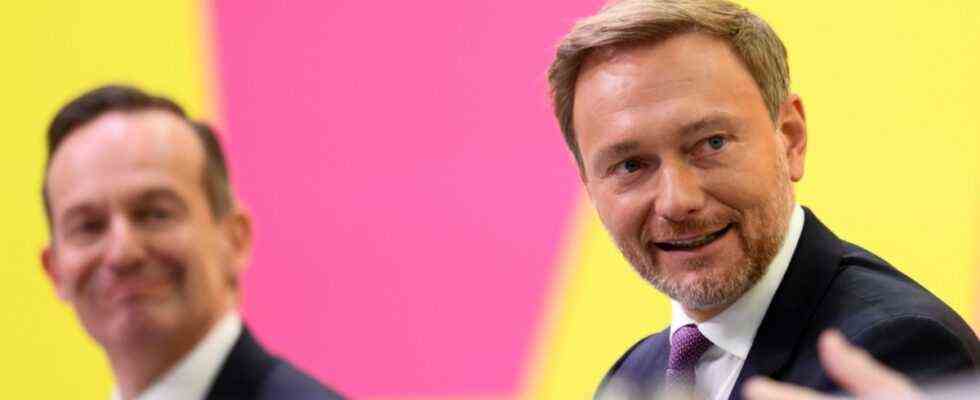As the second party in the likely new traffic light coalition, the FDP approved the coalition agreement with the SPD and the Greens this Sunday. On Saturday, an SPD party congress had already approved the paper – now the delegates of the largely digital, extraordinary FDP federal party congress followed and approved the 177-page paper.
On Sunday there were 535 votes in favor and 37 against, as well as eight abstentions for the coalition agreement. The FDP calculated an approval rate of 92.24 percent.
In his speech, FDP chairman Christian Lindner had previously vehemently promoted the coalition agreement. “It is a coalition agreement for a policy of the center that does not move our country to the left, but wants to lead it forward,” said Lindner at the digital party congress. Because of the corona pandemic, essentially only the party and conference presidium were present at the venue in Berlin.
“This country will benefit from this coalition”
Lindner, who is to become finance minister in the traffic light coalition, emphasized, among other things, that the contract renews the liberal promise of education and promotion. He stands for a socio-political awakening and modern immigration law, provides solid finances and digitization of the state and society. “I am convinced that this country will benefit from this coalition, a new departure in Germany is possible,” said Lindner.
“This coalition agreement contains many projects and concerns of the Free Democrats,” he said. “I’ll go so far as to say: If there had been a possible Jamaica constellation in 2021, there would not have been more liberal politics than is now possible in this traffic light constellation.” All the more, there is now more liberal content than was possible four years ago in the broken talks about a Jamaica coalition with the Union and the Greens.
Four years ago the FDP had the courage to say no to government participation because little liberal politics were visible. “And just as we should now, four years later, have the courage to say yes to a coalition that – as unusual as it may be for the federal level – contains a lot of liberal politics.”
Lindner emphasized: “Today we can say: It is better to dare to venture into this coalition than to forego design opportunities.” At the same time, he asked for “patience and tolerance” if the FDP should not be able to implement all of its projects right away and also had to make compromises in ongoing government activities.
Bettina Stark-Watzinger, who is slated to be Minister of Education, said the coalition agreement does not only contain clear projects. “We have breakthroughs in areas that have been politically neglected for years.”
The deputy chairman Johannes Vogel also said it was right to take on responsibility now. “The coalition agreement (…) expects everyone – including us,” he admitted. However, progress from the middle can only be achieved if you also take a step towards others. “And we need progress because in recent years there has been too much lowest common denominator in Germany, too much just driving on sight.” In terms of megatrends such as digitization, decarbonization and demography, Germany is therefore in a bad position.
There was practically no criticism from the delegates in the debate on the treaty. Due to the corona pandemic, these were only activated digitally.
98 percent approval of the SPD
On Saturday, more than 98 percent of the delegates approved at an SPD party congress. The result of the basic vote of the Green members is expected this Monday. If this vote is also positive, the coalition agreement is expected to be officially signed on Tuesday.
On Wednesday, the SPD chancellor candidate Olaf Scholz wants to be elected as Angela Merkel’s successor in the Bundestag. FDP leader Christian Linder is to become finance minister.

